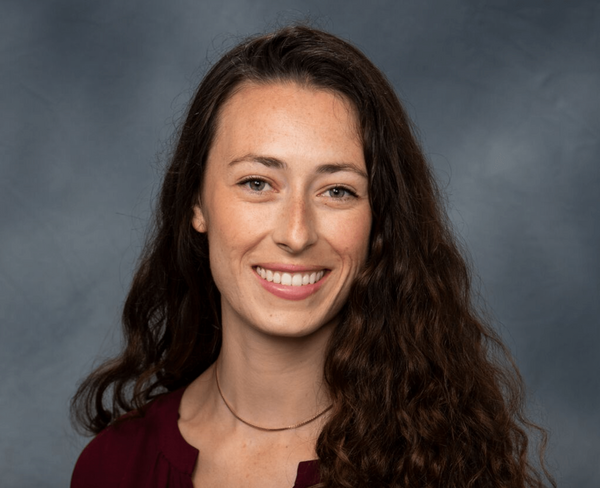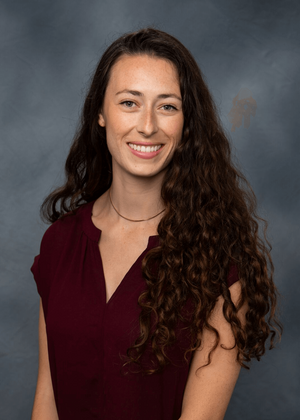
Jessica Carney is a current fellow at the Eck Institute for Global Health. She has a BA in Psychology from the University of Colorado, completed her Masters in Research and Experimental Psychology from the University of Notre Dame, and is currently working towards her Ph.D. In this Q&A, Jessica discusses her passion for studying interpersonal violence, her work in the BRAVE lab, and her plans for the future.

Q. Tell us about your area of study. How and when did you first become interested in the field?
A.I am a member of Dr. Laura Miller-Graff's BRAVE lab in Notre Dame's Psychology Department. Our lab studies the developmental and intergenerational effects of violence exposure, with a focus on mothers and young children. I’ve been interested in this work since I volunteered to raise awareness about teen dating violence and sexual assault when I was a high school student. I didn’t realize it at the time, but talking with my high school peers about their experiences of interpersonal violence and trying to connect them with supportive resources had a profound impact on my interests and ultimately started me on the path to where I am today.
In college, I declared a Psychology major and a minor in Women and Gender Studies. I thought that I would become a counselor at a rape crisis center. However, over the course of my undergraduate studies, I became curious about how we can be sure that the therapies offered to those who have experienced interpersonal violence are actually helpful. Through my work in clinical settings after graduating, I also realized that I did not want to be a full-time therapist for the rest of my career, and wanted to instead address my questions on a larger scale. This led me to psychology research.
Q. What are you currently working on, and what do you hope to accomplish with it?
A. With the support of the Eck Institute, I have been building a program of research that examines the experiences of pregnant women exposed to intimate partner violence across three cultural contexts (U.S., Mexico, and Peru). I focus on both barriers to and facilitators of these women’s wellbeing, including psychotherapy. For example, barriers that have emerged across contexts include women not knowing about the existence of supportive resources in their communities, as well as fear that pursuing support will cause escalating violence in their relationships. Yet, women exhibit incredible resilience in the face of partner violence, including drawing strength from their role as a mother and motivation to better their own and their children’s lives
The goal of this line of research is to provide within-and across-context guidance for evidence-based approaches to mental health support for pregnant women following partner violence. Women in a semi-urban area in Peru experiencing partner violence may need some different support than women in South Bend, for example, due to both cultural expectations as well as what resources are available in those contexts. Most evidence-based mental health supports for women exposed to partner violence have been developed and evaluated in the U.S. and Europe; cross-cultural implementation of mental health supports can advance cultural imperialism if done without true collaboration and equal power. I aim to avoid this through close collaboration with local partners in the contexts where I work. Ultimately, I aim to improve mental health support through modifying these treatments to be relevant to pregnant women’s experiences both within their local contexts and across cultures.
Q. How have you benefited from your experience as a global health fellow?
A. Although the BRAVE lab conducts research within the U.S. as well as in other countries, the psychology department at Notre Dame does not have a specific track or focus on global mental health. Because of that, the Eck Institute has been the primary route through which I have been exposed to global health research. I have been inspired by attending talks through Eck about healthcare and resource access around the world and hearing from Eck’s community of passionate scholars. My time as a global health fellow has allowed me to devote much more time to my research and collaboration with community partners than I would have been able to otherwise, which has felt like such a gift.
Q. Do you have any plans for the future? If so, what are they?
A. I am in the midst of writing up a thematic analysis of focus groups in Lima, Peru. The manuscript focuses mostly on what women report wanting out of group therapy during pregnancy and after violence exposure, including information about breastfeeding, safety planning, and access to economic resources. I’m also hoping to pass my comprehensive exams for Ph.D. candidacy this summer.
Q. Can you tell us a fun fact about yourself or something you enjoy doing in your free time?
A. I was born and raised in northern Colorado, so I enjoy doing pretty much anything that involves time outdoors. On most weekends you can find me hiking or gardening.
Originally published by at globalhealth.nd.edu on April 26, 2022.